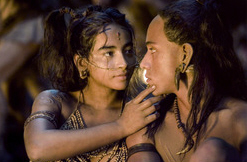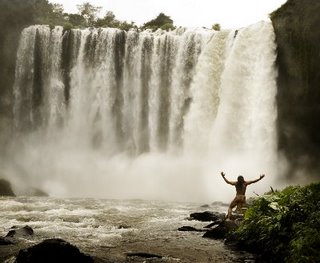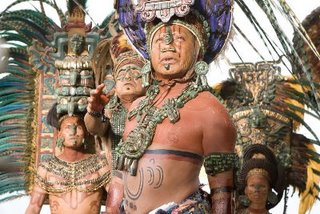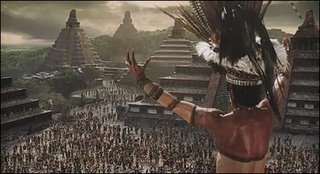The Best Movie of 2006
 Perhaps surprisingly, I am naming what is essentially
Perhaps surprisingly, I am naming what is essentiallya chase picture, APOCALYPTO, the very best picture of 2006.
I guess because I saw it so early last year, for the vast majority of 2006 I considered James McTeique's V FOR VENDETTA my favorite film of the year. Later, I thought about Oliver Stone's WORLD TRADE CENTER. Most recently, I felt strongly that Alfonso Cuaron's CHILDREN OF MEN was worthy. Valerie Farris and Jonathan Dayton's LITTLE MISS SUNSHINE was in the running as it stands as one of the funniest, yet poignant, movies I've ever seen. More than all those, I was so utterly moved by Alejandro Gonzalez Inarritu's great work, BABEL, that I was positive I would name it the best film of 2006. Nope.
I believe the single best movie of 2006 is Mel Gibson's APOCALYPTO. Don't think I haven't given this a lot of thought. I have. The fact is that no film resonated with me more during the 2006 calendar year. If you've not seen this movie please hear this: APOCALYPTO is violent. It is as violent as you've heard and probably even more so. It may be the most violent movie I've ever seen, but it is also the only film from last year when, after seeing it, I felt a very strong pull to rush back to the theater for a second viewing. Additionally, it is one of the most well-crafted films I've ever seen. Frankly, I believe that APOCALYPTO is a modern masterpiece and that it will eventually be looked back upon as such.
Let me say this one more time and say it loud and clear. APOCALYPTO is full of brutal violence: If you cannot handle that do not see this picture!
At first I wanted to see APOCALYPTO out of a mild curiosity simply because I had heard that it was "a film about the collapse of the Mayan empire" and that, once again, Gibson had decided to use a foreign language throughout the entire film so it was subtitled. It was simply the weirdest idea for a film I could conceive of. I was intrigued. However, given Gibson's recent well-publicized meltdown and apparent brokenness, I honestly thought this was going to be the final nail in Gibson's coffin.
In favor of the picture, there were Gibson's previous directorials. To me, all three of his previous films were very good, if not great. In order of caliber they are: BRAVEHEART (1995), THE PASSION OF THE CHRIST (2004), & THE MAN WITHOUT A FACE (1993). And, yes, I did name BRAVEHEART the best film of 1995 and found it completely deserving of its Best Picture of the Year Academy Award. But, I promise, I'm not holding any torch for Mel Gibson they way I do for say Steven Spielberg. Nevertheless, given Gibson's record, I knew the odds were that APOCALYPTO would at least be a well-made movie.
Nothing prepared me for what I would see. The fact is there wasn't another film out there like APOCALYPTO last year. It's totally set apart from the crowd. Ironically, action pictures are usually my least favorite genre of film and this is essentially an action picture. It's a chase film. However, it's more like an art-house chase film. There's a lot of depth to it, lots of layers of important themes like understanding your identity, fear, courage, destiny, and spirituality. This picture really made me think.
On my first viewing the best word I could come up with to describe this picture is riviting. It was a non-stop rollercoaster ride that had me totally engrossed for entire 2 hours and 20 minutes. It was relentless in stirring my emotions and I didn't know what hit me. I walked out of the theater and immediately told Chrisy I thought it was one of the best films I had ever seen and, "I need to see that again." So, a couple weeks later I went back so that I could watch it from a different perspective, enjoy the movie making itself. Now that I knew what was going to happen I could relax and take in the craft.
I supppose I thought this film would be a detached macro take on the decline of the Mayan society. However, it's actually told through a micro study of a single character: Jaguar Paw. Played by Rudy Youngblood, this was a character I was fully invested in. I cared about the fate of Jaguar Paw. The key to this connection for me was that I felt a genuine affinity for both Jaguar Paw as well as his pregnant wife, Seven, who is played by Dalia Hernandez.
For those of you wondering, "What's it really about?" Here's what happens. We first meet the male characters while they are on a hunt. These initial interactions between the men are so important because, despite the cultural and time gulfs between us and them, it is here that Gibson makes us feel a kinship with the characters. After their hunt, through an unexpected encounter with strangers in the jungle, there is foreshadowing of the danger that will come. Before the danger strikes though the men go back to their village and we meet the rest of their clan. As viewers we are drawn to the humanity, humor, and love of these characters as we are introduced to wives, children, and extended families.
About a half-hour into the film all hell breaks loose as a group of warriors sneak into this peaceful settlement and begin ravishing the village. What happens here is unspeakable, painful, and difficult to watch. The key here is the hatred we soon feel for one character, Snake Ink. He commits an act that is so heinous in front of Jaguar Paw, that we are instantly brought into the rivalry that will last throughout the film. Marvelously acted by Rodolfo Palacias, Snake Ink also gives Jaguar Paw the condescending nickname, Almost. This is meant to mean, "you almost killed me." However, it is said in such a manner throughout the film that it comes carry the meaning, "You are almost worthy" or "You are almost human" or things along those lines.
The men from the settlement that we care about are kidnapped and carried off on a shuddersome journey though the jungle. This includes Jaguar Paw, but not before he hides his wife, Seven, and little boy, Turtles Run, in a large pit for safety. He promises to return. We don't believe it's possible and herein lies our deepest desire throughout the entire nailbiting adventure. He simply must live in order to rescue his pregnant wife and child.
The prisoners are taken to the grand Maya city. More specifically, they are taken to the pyramid where large crowds are able to watch human sacrifices to the gods. All of this is repugnant and frustrating. We are witness to beheadings. I will not tell you what happens after the decapitations, just that eventually the hero of the film, Jaguar Paw, is trying to escape from the Mayan warriors and get back to save his family. The remainder of the film is an exciting chase through the jungle. There is not a moment of downtime for the escapee or the audience.
I want to talk about some of the themes here. Early in the film, Jaguar Paw's father warns him about letting fear into his heart. It's a wonderful moment. This is a movie about courage. We also get the sense that Juguar Paw has a destiny to fulfill. Hence the tagline on the poster, "No One Can Outrun Their Destiny." Jaguar Paw obviously is being protected by some supernatural force and we begin to see that he is connected to his surroundings in a very harmonious way.
For me, one of the most important elements of this film is the idea of realizing the power of grasping your true identity. There is an important moment where Jaguar Paw takes claim of this power shouting something to the affect of: "I am Jaguar Paw, son of Flint Sky, this is my forrest. I hunted it with my father, I will hunt it my children, and they will hunt in it with their children after I am gone." It is powerful beyond words and it made me want to shout, "I am Shenandoah Lynd, son of the Living God, and the Evil One cannot touch me! I am a servant of Christ and my children will serve the risen Nazarene long after I am gone!"
To be sure, there is a lot of spirituality in this film. One scene that comes to mind is a prophesy from a diseased girl. I love this scene. I figure if God could speak through a talking ass (see Numbers, chapter 22), then He could talk through a dying little girl. For me there are elements of good versus evil in this movie. There was an obvious darkness and spiritual warefare at the top of the sacrifical pyramid. In contrast, although disturbing, this girl with "the sickness" is clearly warning the wrongdoers that Jaguar Paw is not part of the darkness.
Much has been made of Gibson's claims that the downfall of the Mayan civilization has paralles to our own modern society. The paralles are valid. The movie opens with this quote:
We are left to question whether this quote applies more to the Mayans or to the United States. Moreover, why exactly did the Mayan civilization abruptly come to an end? We are left to wonder, was it disease, nature as in drought, bad leadership, or ungodliness? Perhaps it was their poor interpretation of how their gods would actually want them to treat another human being? Is it them or us that don't value the sanctity of human life? Maybe their society just imploded due to social forces? Again, regardless of what actually happened, the paralles are meritorious.
What is not clear is what exactly the similarities Gibson intended to make. He doesn't spoon feed us his message which is great. I've heard that he said the human sacrifices in the film are represenative of our modern day human sacrifices: send young men to Iraq. I don't know if that's even true. Yet, maybe you see that ongoing slaughter as similar or maybe you see legal abortions as our equalivant of human sacrifices. Perhaps you have compassion for homosexuals in our America because they are the "Almosts" as in almost allowed to have the same rights as heterosexuals. In that case, bigotry is the social force you're concerned might pull us under. On the other hand, maybe you see those that want to give homosexuals the right to marry as something that is going to have our society go the way of the Mayans. Whatever your view, one thing I noticed was that there are a lot of humans in this particular film that treat fellow human-beings as "other" and that can never be a good thing. One of the things they worshiped was Kukulkan while we aparently worship Anna Nicole Smith. You can take what you want from this film.
As I later pondered the mistreatment of the "others" in this film, I was reminded of a sermon my pastor gave the Sunday following 9/11. He posed the question: "What is wrong with this world?" And he answered it: "I am." What's wrong with this world is not some bearded man in a turban, a slave trader, hijacker, some member of a group I enjoy demonizing, or some other person's sin because their sin is not as bad as my acceptable sin. I thought about that. Then, before I let myself act all high and mighty, judging the Mayans, I thought about the words of Jesus during the Sermon on the Mount, specifically chapter 5:21-22. He says, you've heard the command, "Do not murder," and then he puts those of us who have called someone else a name or harbored anger for a brother in the same group as murders. I imagined myself figuratively swinging the machete, whacking the head off, and riping the heart out, of all those people I have insulted, talked down to, condescended to, or otherwise verbally assaulted. There are a lot of bodies in the wake of my path. Do I really believe that it's all part of the same sin?
Much of the art I love is left open to interpretation. APOCALYPTO isn't preachy in whatever message is lurking beneath the surface. Like I said, it makes you think, it makes you yearn for a discussion, but it's just unclear enough to let you draw your own conclusion about what we can learn from the Mayans.
It is clear is that Gibson is a masterful filmmaker and a technical genius with balls the size of church bells. He has has obviously assembled a group of amazing craftsmen because the look of this picture is a phenomenal in terms of its lighting, editing, sound, makeup, costumes, camerawork, and, perhaps most of all, its foreboding musical score by James Horner. Sadly, it's only up for Academy Awards in the categories of sound editing, sound mixing, and makeup. The makeup is truly artwork and worthy of that distinction. Aparently Gibson shot the entire thing digitially. I couldn't tell. Some of the temple and city scenes were so spectacular, so epic, that I'm anxious to see a "making of" DVD. Were the crowds all extras or CGI effects? I couldn't tell.
In short, Mel Gibson's APOCALYPTO is a very smart action film. It made my blood pump and put my adrenaline in full gear. At the same time, my heart was fully invested in the characters and it made me think. Moreover, it's technically brilliant and a feast for the eyes. It has affected me more and stayed with me longer than any other film I saw last year. It's my favorite film of 2006, Gibson's best directorial to date, and I believe it's the best picture of year.
Labels: film









0 Comments:
Post a Comment
<< Home